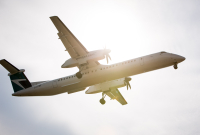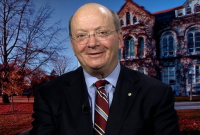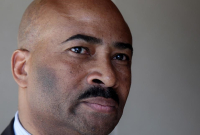Support strong Canadian climate journalism for 2025
Thousands of Mounties are forging ahead with a high-stakes union drive, despite a Senate decision last week that they say could slow the process by months.
The National Police Federation (NPF) filed an application for certification on Tuesday night with the Public Service Labour Relations and Employment Board, the federal body that administers collective bargaining for federal public servants.
The NPF is one of two organizations seeking to represent rank-and-file Mounties, who were banned from forming a union until a 2015 Supreme Court decision confirmed that they had a right to collective bargaining. As of Sunday, the NPF had signed up at least 9,700 members, which is more than half of the 17,945 RCMP members the union aims to represent.
A second organization, the Mounted Police Professional Association of Canada, is also hoping to represent the same members, but membership in the NPF surged over the weekend, the organization said.
NPF co-chair Brian Sauvé said the organization expects that a decision by the Senate last week to maintain a Stephen Harper-era rule requiring a vote by secret ballot to certify new unions will add months to the process. The same Senate decision also threatens a union drive for WestJet pilots, the Canadian Labour Congress (CLC) told National Observer last week. The Senate decision may be overturned in the House of Commons.
Trudeau government promised repeal of secret ballot rule
Until 2013, unions could be recognized as workers’ representatives by showing that a majority of employees in a workplace had signed union membership cards. That practice was ended and a secret ballot vote was required, even if a union could show that a majority of workers had signed cards, as a result of passage of private member's bill C-525.
In January 2016, shortly after being elected, Prime Minister Justin Trudeau’s government introduced a bill to repeal C-525, but until last week it was held up in the Senate, where Conservative Senator Scott Tannas added a last-minute amendment to retain the secret ballot requirement, effectively blocking the Liberal plan. The Liberals now will have the opportunity to reject those amendments in the Commons, but a vote won't happen at least until May, when members of Parliament return.
A spokesman for federal Labour Minister Patty Hajdu said the government plans to repeal the amendment in the Commons.
The NPF had hoped that the union could officially represent the Mounties by fall 2017, Sauvé said. If a vote is required, he said certification this year is unlikely.
Holding a certification vote won’t be easy, Sauvé said: almost 20,000 RCMP members work in 800 communities spread out across 75 per cent of Canada, including many isolated, fly-in communities.
But the Mounties aren’t waiting around, Sauvé said. They’ve already waited since June 2016 for the House to pass Bill C-7, which amended the federal law that banned RCMP members from forming a union. That bill was introduced in March 2016 and amended by the Senate after complaints from Mounties that it limited their ability to bargain. Since the bill passed third reading in the Senate, the House hasn’t taken it up for almost a year.
“It would be nice if we could trust that the government would deal with the amendments in short order, but RCMP experience is that the government doesn’t deal with legislation that affects us in a timely manner,” Sauvé said.
WestJet pilots also seek union certification
The move comes as Mounties across the country tore off or taped over the yellow stripes on their uniform pants in protest of what they said was a too-small pay raise announced in early April. RCMP commissioner Bob Paulson said on April 12 that although he was concerned that the protest could erode public trust in the Mounties, individual officers wouldn't be disciplined.
NPF members weren't the only ones hoping the Senate would repeal the secret ballot requirements. WestJet pilots are aking a second attempt to unionize. The Canadian Labour Congress (CLC), which is affiliated with the Air Line Pilots Association, the union some WestJet pilots are hoping to join, told National Observer that the would-be pilots' union was waiting for a repeal before filing for certification. CLC President Hassan Yussuff said that delays at the Senate put the union drive in jeopardy.
WestJet has supported the secret ballot requirement, and the WestJet Pilots Association, the employer-sanctioned organization which currently represents pilots at the union, also hired lobbyists to push Senators to keep the provisions.
Yussuff said the CLC was concerned that, if the secret vote amendment wasn't repealed, union cards already signed by WestJet pilots might no longer be valid by the time the organization is able to apply for certification. Cards are only valid for six months after they are signed.
The NPF's Sauvé said that so far stale cards weren't a concern for the Mounties, because most of their union cards were signed recently.






Comments